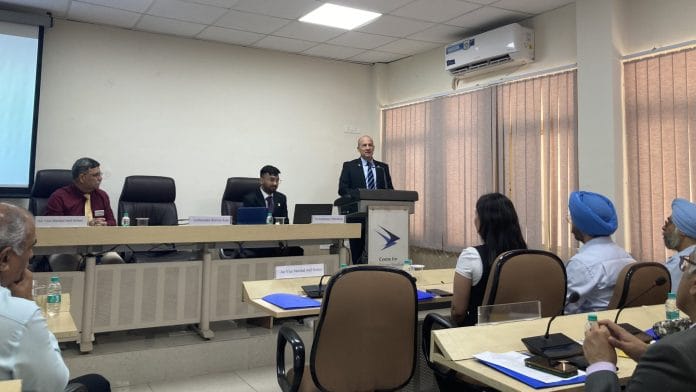New Delhi: Israel’s ability to locate terrorist targets and strike within seconds has been one of its strongest tactical gains during the current war in Gaza, along with underground warfare, destroying hundreds of kilometres of tunnels.
These tactics and experiences are being shared with India, said Tel Aviv’s envoy Reuven Azar Friday.
He said Israel and its “friends” could learn from the country’s failures and successes (in the War in Gaza). “Television is more concentrated on visuals, which are very tragic. But they do not concentrate on the actual tactics being used in the war,” Azar said.
The Israeli envoy added: “We have worked on perfecting targeting terrorists within seconds after they are located. This is something we can share. We have destroyed hundreds of kilometres of tunnels. We have also faced the challenge of dealing with terrorists who embed themselves within civilian and humanitarian zones.”
Azar said its active and passive defences for armoured weapons such as tanks, which has been successful in Gaza, were already a part of the discussions between both countries.
The Israeli envoy was speaking at the launch of the book ‘The Evolution of Israel’s National Security Doctrine: A Journey from Ben-Gurion to Netanyahu’, authored by strategic affairs commentator Ratnadeep Chakraborty. The event took place at the Centre for Air Power Studies (CAPS) in Delhi.
Among the panellists were Chancellor of Central University of Kashmir Lt. General Syed Ata Hasnain (Retd), CAPS Director General Air Vice Marshal Anil Golani (Retd), and CAPS distinguished fellow Shalini Chawala.
In recent days, the scale of Israel’s technical prowess has been seen across the world, with the simultaneous detonations of nearly 3,000 electronic pagers and hand-held radio communication devices operated by Hezbollah in Lebanon. The lethal attack on the Lebanese militant outfit’s communications systems has left 37 dead and nearly 3,000 injured.
While Israel has been silent on the attacks, it is widely believed that its spy agency Mossad was behind the sabotage of Hezbollah’s communications.
Tel Aviv’s retaliation to the 7 October, 2023 attacks by Hamas has seen its military invade the Gaza strip, which has left over 40,000 Palestinian dead. Large swathes of the Strip have been laid waste as Israel continues its war against Hamas.
Hamas, in its initial attack killed nearly 1,200 Israelis and took another 250 people as hostage. The war has been ongoing for nearly a year, with around 100 hostages still remaining in Gaza.
‘No capable Palestinian leader to maintain peace’
On the future of the Palestinian state, Azar emphasised an Israeli security presence was necessary — until at least the defeat of the radicals — given the lack of a capable Palestinian leader to maintain peace.
“Israel does not want to directly rule the daily life of Palestinians. We live in a region with such radical forces, where no Palestinian leader is capable enough to keep the peace today. The only way to prevent a terrorist state in Judea and Samaria is through a continued Israeli security presence,” said Azar.
He added: “With pragmatic countries like India and other partners we could manage to sustain against the current wave of radicalism. When we are able to defeat the radicals, there is a chance at the end of the day for an independent Palestine. But only after the defeat of radical forces.”
The Israeli envoy said after the end of the war, Tel Aviv would look to continue to work with nations in the region to combat militant forces. Israel in 2020 was able to normalise ties with four Arab countries — United Arab Emirates (UAE), Morocco, Bahrain and Sudan — with the signing of the Abraham Accords.
There were reports of steps being taken for the normalisation of ties between Israel and Saudi Arabia, before 7 October, 2023. However, the war in Gaza has put a strain on ties between countries in West Asia and Israel.
The Israeli envoy pointed out that military coordination between Israel and neighbouring countries had been seen under America’s defence umbrella, namely under the United States Central Command (CENTCOM). This coordination was seen in April, when a coalition of nations intervened when Iran launched over 300 missiles at Israel in retaliation to the bombing of Tehran’s diplomatic compound in Syria.
A number of countries including the UK, US and Jordan deployed their military to intercept Iranian missiles.
(Edited by Tikli Basu)






